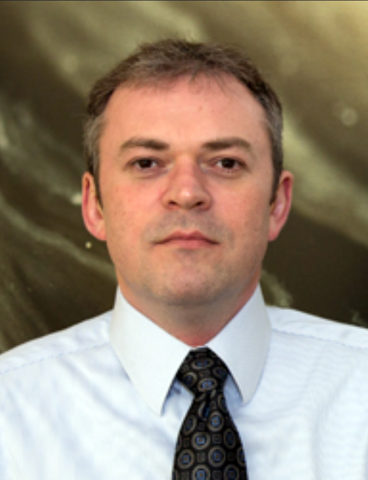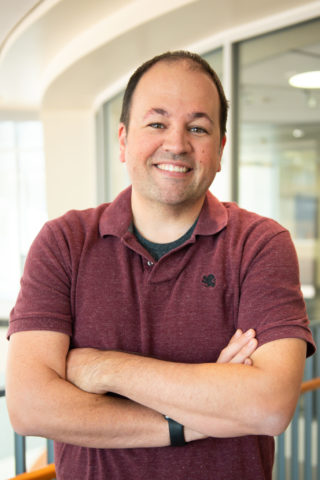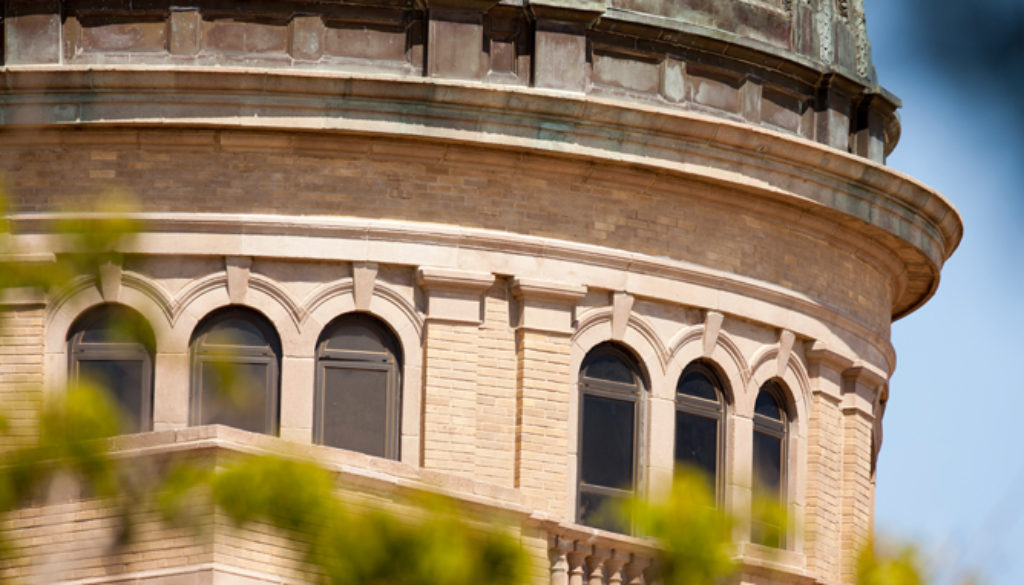Safonov, Sorg Named to 2020 Class of Chancellor EDGES Fellows
Two faculty in the College of Science are among 19 Texas A&M University faculty named to the 2020 class of Chancellor Enhancing Development and Generating Excellence in Scholarship (EDGES) Fellows, announced October 7 by Provost and Executive Vice President Carol A. Fierke.
Physicist Alexei Safonov and biologist Joseph Sorg both received the coveted honor, created in 2019 with the help of resources from Texas A&M University System Chancellor John Sharp to honor, incentivize and elevate mid-career faculty who are making significant marks in their disciplines. The recognition highlights Texas A&M’s intentional commitment to intensively support, retain and recognize faculty with significant and sustained accomplishments and the promise of continued high-impact scholarship.

EDGES Fellowships are awarded to faculty members identified by their deans as being worthy of national and international acclaim with careers on a trajectory consistent with potential membership in national academies or national and international awards in fields without national academies. In addition to receiving crucial funding support, EDGES Fellows retain their titles throughout their tenure as Texas A&M faculty members in good standing. The awards, in combination with endeavors such as the President’s Excellence Fund and similar faculty reinvestment programs, are intended to empower and advance the careers of faculty at all levels, particularly the critical mid-career stage.
“These awards recognize the priority of Texas A&M University System Chancellor John Sharp to develop and support faculty members with national and international acclaim,” Fierke said. “The honorees are scholars with careers on track to make high-impact contributions to enhance the state and nation, leading to national and international recognition.”
Safonov and Sorg join Texas A&M chemist Sarbajit Banerjee and Texas A&M biologist Gil Rosenthal, who were recognized among the inaugural class of EDGES Fellows in 2019.
Safonov joined the Texas A&M Department of Physics and Astronomy in 2006 after earning his Ph.D. from the University of Florida in 2001. Since being recognized with a 2007 U.S. Department of Energy (DOE) Outstanding Junior Investigator Award, he has taken leadership in establishing Texas A&M as a strong research team in the Compact Muon Solenoid (CMS) experiment at CERN’s Large Hadron Collider. The CMS experiment involves 5,000 scientists from 200 institutions in 50 countries and a detector with an overall mass of 14,000 tons that records one megabyte of data from each of the 40 million collisions that happen every second. Under Safonov’s leadership, the Texas A&M CMS team has grown to 30 people, including faculty, researchers, engineers, and graduate and undergraduate students here and at CERN. In 2012 the CMS and ATLAS collaborations jointly announced the discovery of the Higgs boson, the carrier of the scalar field that generates masses for all fundamental particles — a breakthrough that earned the European Physical Society’s 2013 High Energy and Particle Physics Prize and led to the 2013 Nobel Prize in Physics being awarded to the theoretical physicists who predicted the existence of the Higgs particle in the 1960s. Safonov’s team continues playing a leading role in the CMS experimental program, which currently is searching for evidence of new Higgs particles suggested by several theories to explain the striking matter-antimatter asymmetry in the Universe, along with signals of new gauge interactions that may yield clues to the nature and origin of the astrophysical dark matter. That search will span the coming decade and require 1,000 times more data than was required for the original Higgs discovery as well as significant CMS experiment upgrades. Safonov is a leading figure in the latter effort, which is supported by an international coalition of scientists and funding agencies, including the DOE and National Science Foundation. As evidence of the high international esteem in which he is held, Safonov has served since 2017 as the manager of all U.S. projects related to the High Luminosity-LHC upgrades of the CMS muon systems. Closer to home, he also is the primary principal investigator for Texas A&M’s DOE umbrella grant for high energy physics research that supports the work of more than 40 experimental and theoretical particle physicists. In addition, he has been identified as one of Texas A&M’s top five faculty in terms of aggregate research funding in a recent study of federal research support from all national laboratories and the DOE. Equally respected as an instructor, Safonov was honored with a 2007-08 Montague-Center for Teaching Excellence (CTE) Scholar Award.

Sorg joined the Texas A&M Department of Biology in 2010 and also holds a courtesy joint appointment in the Texas A&M Health Science Center Department of Microbial Pathogenesis and Immunology. Since his postdoctoral days at Tufts University, Sorg has been working to unlock the basic science behind the deadly gut bacterium Clostridium difficile, a highly contagious hospital-acquired pathogen designated by the Centers for Disease Control as one of its five most urgent threats to the U.S. Nationwide, C. difficile causes more than 500,000 infections and 29,000 deaths each year at a total societal cost exceeding $5 billion. Sorg earned his doctorate in microbiology at the University of Chicago in 2006 and since has emerged as one of the pioneers of C. difficile study. His research, which has been funded since 2013 by continuous grants from the National Institutes of Health (NIH), focuses on the mechanisms by which C. difficile spores germinate in order to develop new strategies to combat infection as well as how C. difficile interacts with host-derived bile acids to determine how that interaction affects the pathogen’s underlying physiology. Sorg and his group achieved perhaps their biggest breakthrough to date in 2017, using CRISPR/Cas9 technology to develop a new genetic system capable of rapidly and easily introducing mutations into the C. difficile genome and thereby delivering a decisive advantage to the entire C. difficile research community. He and his postdoctoral mentor at Tufts, Linc Sonenshein, also have co-founded the company Exarca Pharmaceuticals that is working to create a drug which can prevent dormant C. difficile spores from germinating and causing disease. Beyond his research, Sorg has been recognized for his teaching, earning a 2013-14 Montague-CTE Scholar Award that he used to develop an open online course to assess the preparedness of students registering for Biology 351, Fundamentals of Microbiology. A member of American Association for the Advancement of Science, the American Society for Microbiology and the Anaerobe Society of the Americas, he is an associate editor for Frontiers in Microbiology-Microbial Pathogenesis, an ad hoc reviewer for more than two dozen additional journals spanning microbiology, bacteriology, medicinal chemistry and pediatrics, and a standing member of the NIH Bacterial Pathogenesis (BACP) study section.
To learn more about faculty in the College of Science, visit https://science.tamu.edu/faculty/.
# # # # # # # # # #
About Research at Texas A&M University: As one of the world’s leading research institutions, Texas A&M is at the forefront in making significant contributions to scholarship and discovery, including in science and technology. Research conducted at Texas A&M generated annual expenditures of more than $952 million in fiscal year 2019. Texas A&M ranked in the top 20 of the most recent National Science Foundation Higher Education Research and Development survey based on expenditures of more than $922 million in fiscal year 2018. Texas A&M’s research creates new knowledge that provides basic, fundamental and applied contributions resulting, in many cases, in economic benefits to the state, nation and world. To learn more, visit Research@Texas A&M.
-aTm-
Contact: Shana K. Hutchins, (979) 862-1237 or shutchins@science.tamu.edu or Dr. Michael Benedik, (979) 845-4016 or benedik@tamu.edu
The post Safonov, Sorg Named to 2020 Class of Chancellor EDGES Fellows appeared first on Texas A&M College of Science.
